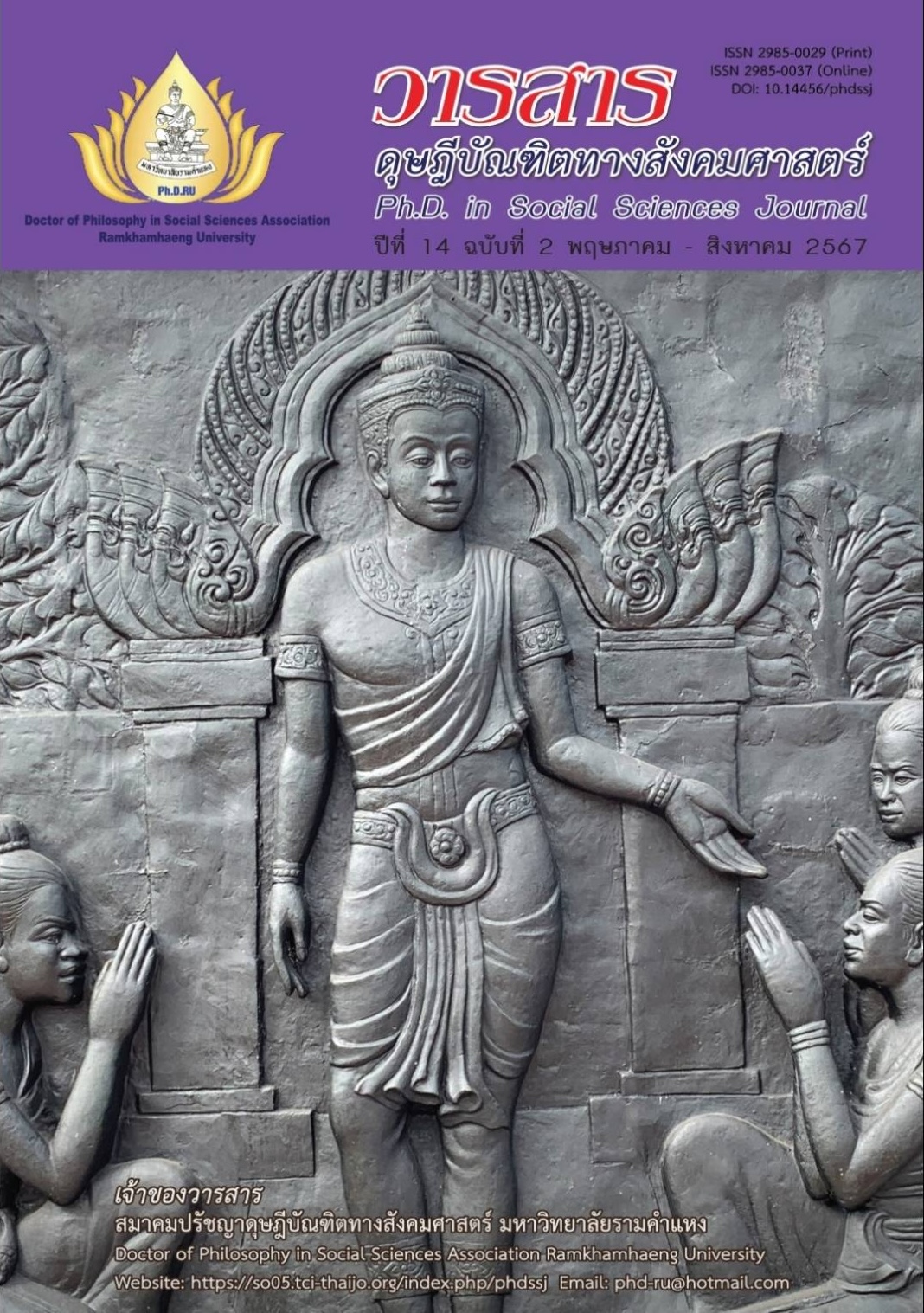Causal Factors of Green Logistics Management Affecting the Business Performance of Palm Oil Industry
Main Article Content
Abstract
This research article aims to study (1) the causal factors influencing green logistics management and business performance of the palm oil industry. and (2) the influence of causal factors influencing green logistics management and business performance of the palm oil industry. The sample is from the Thai palm oil industry and consists of 346 firms. The research instrument was a questionnaire. Second-order confirmatory factor analysis and structural equation modeling (SEM) were used for the statistics used to test the hypothesis.
Findings are as follows: (1) organizational environment has a direct and positive influence on green logistics management (2) organizational resource capabilities has a direct positive influence on green logistics management (3) green logistics management has a direct positive influence on organizational performance (4) green logistics management has a direct positive influence on competitiveness (5) competitiveness has a direct and positive influence on organizational perfor- mance (6) organizational environment. Has a direct and positive influence on company perfor- mance (7) organizational resource capabilities has a direct and positive influence on company performance. And the hypothetical model is consistent with the empirical data. χ2 = 83.68, p-value of 0.30, CFI = 1.00, GFI = 0.97, AGFI = 0.94, RMSEA = 0.03.
Article Details

This work is licensed under a Creative Commons Attribution-NonCommercial-NoDerivatives 4.0 International License.
Academic articles, research articles, and book reviews in the Ph.D. in Social Sciences Journal are author’s opinions, and not the publisher’s, and is not the responsibility of the Ph.D. in Social Sciences Journal Philosophy Association, Ramkhamhaeng University. (In the case that research is done on human, the researcher has to be trained in Ethics for Doing Research on Human Training and has to produce the evidence of the training).
References
Bahremand, M., & Karimi, R. (2016). Identify and evaluate the factors influencing technological capapilities using fuzzy dematel techniques at science and technology parks (Case study: Knowledge-based companies at mashhad’s science and technology park). Journal of Engineering and Applied Sciences, 11(4), 678-683.
Bhattacharya, A., Nand, A., & Castka, P. (2019). Lean-green integration and its impact on sustainability performance: A critical review. Journal of Cleaner Production, 236, 117697.
Bowersox, D. J., Closs, D. J., Cooper, M. B., & Bowersox, J. C. (2020). Supply chain logistics management (5th ed.). McGraw-Hill.
Cantele, S., & Zardini, A. (2018). Is sustainability a competitive advantage for small businesses? An empirical analysis of possible mediators in the sustainability–financial performance relationship. Journal of Cleaner Production, 182, 166-176.
Chamsuk, W., Fongsuwan, W., & Takala, J. (2017). The effects of R&D and innovation capabilities on the thai automotive industry part’s competitive advantage: A sem approach. Management and Production Engineering Review, 8(1), 101-112.
Cronbach, L. J. (1984). Essentials of psychological testing (4th ed.). Harper & Row.
Dwivedi, Y. K., et al. (2021). Artificial Intelligence (AI): Multidisciplinary perspectives on emerging challenges, opportunities, and agenda for research, practice and policy. International Journal of Information Management, 57, 101994.
Gao, Y. (2017). Business leaders’ personal values, organisational culture and market orientation. Journal of Strategic Marketing, 25(1), 49-64.
Habib, A., Bao, Y., & IImudeen, A. (2020). The impact of green entrepreneurial orientation, market orientation and green supply chain management practices on sustainable firm performance. Cogent Business & Management, 7(1), 1-26.
Hair, J. F., Black, W. C., Babin, B. J., Anderson, R. E., & Tatham, R. L. (2006). Multivariate data analysis (6th ed.). Pearson.
Heizer, J., Render, B., & Munson, C. (2020). Operations management: Sustainability and supply chain management (13th ed.). Peason.
Krungsri Research. (2021). Industry outlook 2020-2022: Oil palm industry. Retrieved from https://www.krungsri.com/getmedia/de09fc89-060d-4545-ac44-1fe91709c640/IO_Oil_Palm_200124_TH_EX.pdf.aspx [In Thai]
Kuo, T. C., Chiu, M. C., Chung, W. H., & Yang, T. I. (2019). The circular economy of LCD panel shipping in a packaging logistics system. Resources, Conservation and Recycling, 149, 435-444.
Likert, R. (1967). The human organization: its management and value. McGraw-Hill.
Maury, B. (2018). Sustainable competitive advantage and profitability persistence: Sources versus outcomes for assessing advantage. Journal of Business Research, 84, 100-113.
Ministry of Industry, Department of Industrial Works. (2017). List of factories that are allowed to operate. Retrieved from http://userdb.diw.go.th/fac_month/menu.asp [In Thai]
Oil Palm and Palm Oil Research and Innovation Institute. (2022). Summary of the number of yard, extraction plant, refinery and biodiesel plant in Thailand. Retrieved from https://drive.google.com/file/d/1IQSsnGG8UMpqOm5j1D8lBFuPRO514O9P/view [In Thai]
Pallant, J. (2010). SPSS survival manual: A step by step guide to data analysis using SPSS. McGraw-Hill.
Rubin, A. (2012). Statistics for evidence-based practice and evaluation. Cengage Learning.
Seroka-Stolka, O., & Ociepa-Kubicka, A. (2019). Green logistics and circular economy. Transportation Research Procedia, 39, 471-479.
Sharma, V. K., Chandna, P., & Bhardwaj, A. (2017). Green supply chain management related performance indicators in agro industry: A review. Journal of Cleaner Production, 141, 1194-1208.


